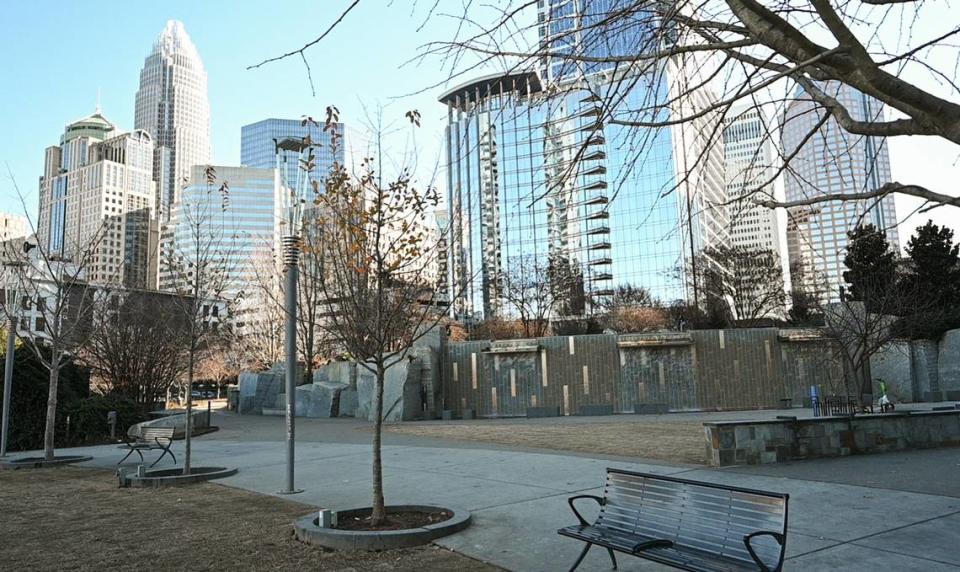This Charlotte mental health center could help fix spiking juvenile crime, committee says
A Charlotte City Council committee endorsed funding a new mental health treatment facility for young people Thursday as part of a multi-year, multi-million-dollar plan to combat juvenile crime.
The council’s Housing, Safety and Community Committee voted unanimously to move to the full council a proposal to put $2.5 million into the Katie Blessing Center — a planned facility that would offer inpatient and outpatient mental health care to young people — as part of the city budget currently being debated.
It was one of six recommendations presented Thursday to the committee by city staff, who worked since February to develop a strategy to address juvenile crime rates. Charlotte-Mecklenburg Police reported an uptick in youth violence in 2023, and a shooting on New Year’s Eve in uptown spurred calls for action from council members and the community.
On Thursday, committee members largely supported all the recommendations, praising staff for taking an holistic approach to addressing violence.
“I think we should remember this date, May 23, 2024, as a historic day in Charlotte,” Council member Renee Johnson said.
But the committee also noted it could be difficult to fund the entire plan, with an estimated cost of $4.5 million in the first year, in the budget that starts July 1. City Council members voted earlier this week to direct city staff to try and find cuts in that budget in order to minimize a proposed 1.5-cent-property tax increase.
“We’re trying to figure out how to cut the budget. This idea is not helping in that particular conversation,” Council member LaWana Mayfield said.
What is the Katie Blessing Center?
Funding for the Katie Blessing Center was the most “time sensitive” proposal presented Thursday, Assistant City Manager Shawn Heath said.
The east Charlotte center, which will be run by the nonprofit Katie Blessing Foundation, is a planned 70,000 square-foot, 72-bed facility in the Central Avenue-Albemarle Road corridor that would include:
A behavioral health urgent care
Short-term and long-term inpatient mental health care facilities
An outpatient mental health care facility
The total estimated cost of the project is $62.5 million, and the foundation has already pledged $20 million of its own money and secured $17.5 million from the state, according to Heath.
Heath said a $2.5 million commitment from the city may help spur more fundraising for the center.
What else is on the table to combat juvenile crime?
Besides the center, the plan presented Thursday included additional recommendations to address juvenile crime and its root causes:
$1.8 million over three years to include more at-risk youth and young people already in the criminal justice system in workforce and employment programs
$1.9 million over three years to expand CMPD youth outreach programs
$2.5 million over three years to expand and start additional community-based programs in Charlotte, such as a mental health first aid program and other to-be-determined grassroots organizations
$500,000 over three years to track outcomes from the city’s investments
Staff estimated funding all proposals would cost $4.5 million in the first year of the three-year program.
The dollar amounts presented Thursday could be adjusted as the council further evaluates financial constraints, said Rebecca Hefner, director of Housing and Neighborhood Services.
“The recommendations are scalable,” she said
The plan also endorsed an item already in the fiscal year 2025 budget — giving $1 million to the Corridors of Opportunity program to expand existing youth outreach initiatives. The corridors program pumps public and private investment into six targeted areas around the city to spur economic development and improve equity.
How will Charlotte pay for crime prevention strategies?
The council is scheduled to hold straw votes on the budget in a week and approve a final budget June 10. The full group will hear the committee’s recommendation and decide whether they’re on board too in their upcoming meeting.
Heath suggested funding could come out of $3.5 million already in the budget for “to support and activate recommendations that come from this committee” but not yet allocated for any specific project.
Committee Chair Victoria Watlington briefly floated the idea of putting an additional $1 million in interest generated from American Rescue Plan dollars into that pot at a meeting earlier in the week. It was tabled because the council wasn’t discussing how to spend ARPA interest during the meeting.
“We really tried to build this initial recommendation set around those numbers, living within our means,” Heath said.
Mayfield said she was supportive of recommendations presented Thursday but added she’s hesitant to use one-time money such as ARPA dollars for longer term projects.
“We’re looking at a multi-year commitment,” she said of the proposed strategy.
In our CLT Politics newsletter, we offer exclusive insight into Charlotte-region politics sent to your inbox on Thursdays. Subscribe for free. Story idea? mramsey@charlotteobserver.com.



